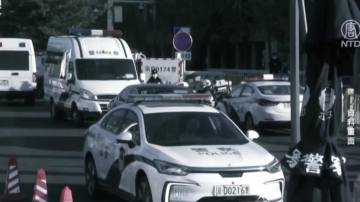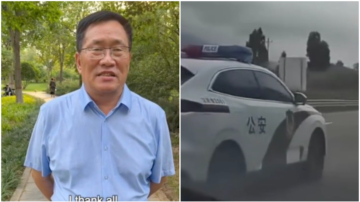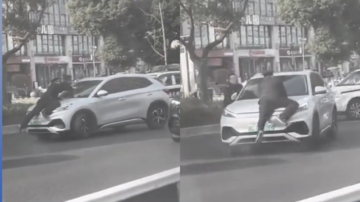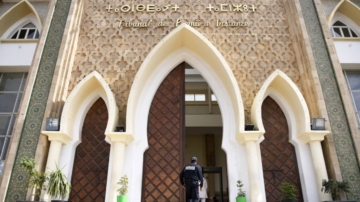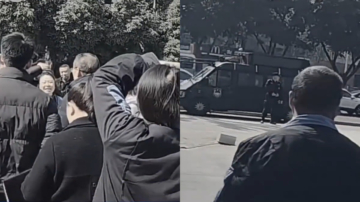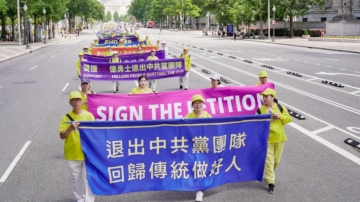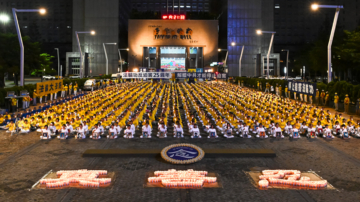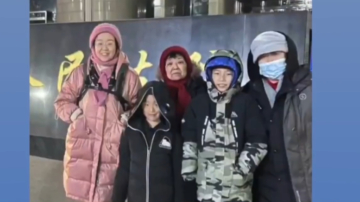【新唐人2013年07月29日訊】大陸搖滾歌手吳虹飛因為發微博「想炸建委」,而被當局以「涉嫌編造虛假恐怖信息罪」刑事拘留,可能被判處5年以下有期徒刑。輿論認為「吳虹飛無罪」的同時,更深一層指出,如何處置吳虹飛事件事關言論自由走向,一旦吳虹飛被重判,則代表著大陸最後的言論自由陣地也被攻陷。
吳虹飛的辯護律師李金星和陳建剛在27號發表聲明說:「從目前掌握的情況來看」吳虹飛的言論沒有達到刑事犯罪具有的標準及危害性,「顯然不構成任何犯罪」。
大陸搖滾歌手吳虹飛代理律師陳建剛:「甚麼叫做犯罪,必須是有嚴重的社會危害性這才能構得上犯罪, 像吳虹飛,說了那麼幾句話,發表了一下個人的情緒,是我想,不是我要,不是我已經做了,這樣根本不應該構成犯罪的。這個案件事關重大,事關老百姓說話的權利、事關釐清言論自由權和犯罪的權利。」
法律界認為,雖然刑法規定,編造、故意傳播虛假恐怖信息罪,可以判處5年以下有期徒刑,但必須是在「嚴重擾亂社會秩序」的前提下,但顯然吳虹並沒有達到這個程度,甚至連《治安管理處罰法》中的「擾亂公共秩序」都沒有達到。因此,兩位辯護律師的觀點,得到了輿論的普遍支持。
中國資深媒體人高瑜:「那怎麼能危害社會啊,網上都說了嘛,中國人最愛罵人了,不管說『弄死你』也好,還是那些國罵也好,你要那麼定,就是全國人都有罪呀,就那些罵人的話啊,這個問題非常荒唐的。」
目前為止,大陸有近八成的網民認為,吳虹飛的微博雖然言辭不當,但很明顯只是抱怨和宣洩的戲言,不會給社會造成不良影響,也不具有任何煽動性,更何況民眾有表達自己的不滿的自由。
中國網路媒體專欄作家劉逸明:「在吳虹飛那裡,所謂的暴力語言不過就是說說而已,我們不相信她真的會去幹出爆炸的事情。」
陳建剛:「每個人有發表個人言論的自由,這是憲法規定的權利,各國除非這種特別集權的國家,否則的話,一個正常的國家,老百姓是有說話權利的,有發牢騷的權利,甚至有罵人的權利。」
也有一成多民眾認為,由於吳虹飛是公眾人物,而且擁有12萬微博粉絲,她的言論過激,可能會起到一定煽動作用,對社會造成負面影響。
劉逸明:「確實公眾人物說話是應該慎重一些,但是你要是說一個人被煽動,那被煽動的方面很多,電視裡面就沒有煽動?那麼多的反映中共革命的片子,包括很多古裝劇裡面官逼民反的,這實際上也可以起到同樣的作用啊,你官方要是事情做的好了,讓老百姓滿意了,不管別人怎麼煽動,也不會出現暴力事件。」
除去上述兩種觀點,只有極少數的人讚同當局處理吳虹飛的作法。
評論人士多認為,當局對付吳虹飛更大的目地是為了打壓言論自由和異見人士,因此當局的做法才招致惡評如潮,因為這關係到了每個網民的切身權益。
劉逸明:「因為吳虹飛這個人是比較敢說話的,當局趁這個機會將她繩之以法。含有明顯的打擊報復,既可以懲罰吳虹飛,又可以起到殺雞儆猴的作用。」
中國網路媒體專欄作家劉逸明指出,中國大陸現在有很多人對中共當局的統治非常不滿,但在網上用言論發泄的人還是比較溫和的,如果中共出於對這些言論的懼怕而持續打壓網路言論自由,那麼無從發泄的民眾,將會從網路世界轉移到現實生活當中,以實際的行動泄憤。
採訪編輯/張天宇 後製/李智遠
Chinese Rock Singer's Detention Imperils Internet Freedom of Speech
Chinese rock singer, Wu Hongfei, wrote in her micro-blog
that "I want to explode the Construction Commission."
She was detained and charged with "fabricating
terrorist information", she may face 5-year jail term.
The public support Wu Hongfei as innocent, and said that
how the Chinese Communist Party(CCP) deal with
Wu Hongfei is an issue concerning freedom of expression in China.
Many believe that once Wu Hongfei is convicted criminally,
it will signal the end of the freedom of speech.
Wu Hongfei’s two lawyers, Li Jinxing and Chen Jiangang,
issued a statement on July 27.
It says that "based on existing evidence",
Wu’s remarks "clearly do not constitute any crime."
Lawyer Chen Jiangang: "What is a crime?
It should be an act causing serious social harm.
Wu Hongfei has made a few remarks,
just venting her personal discontent.
It was her sentiment, not an attempt at any offence,
nor was it an action that led to any offensive act.
So it is clear that this cannot
constitute a crime at all.
This issue is important, for it affects the matter of
citizens’ rights to freedom of speech.
Distinguishing the right to freedom of expression as
distinct from any criminal offense is what really matters."
Legally, fabrication and the deliberate spreading of
misinformation may mean a 5-year prison term.
Yet, it is premised on the assumption that
"disturbance of public order" will be caused.
This is clearly not the case with Wu Hongfei’s
supposed, "offense", lawyers say.
It was not even a "disturbance of public order"
in terms of public security administration.
The lawyer’s argument has gained wide public support.
(Veteran media professional, China) Gao Yu:
“How could such an utterance jeopardize society?
Today, the Chinese people love cursing, making charges
against persons or against society as a whole.
If it were to be deemed a crime, the entire population
would become criminals. The charge is utterly absurd."
Reportedly, about 80% of Chinese netizens take
Wu’s remark as a form of complaint, improper perhaps, though merely foolish.
They don’t think it could possibly affect
society adversely, neither is it really seditious.
Netizens have commented that citizens must have
the freedom to express their discontent.
(Cyber writer, China) Liu Yiming: "Wu Hongfei just
used unwisely violent language in her remarks.
We don’t believe that she would create a real explosion."
Chen Jiangang: "Anyone should have freedom of speech,
which is a constitutional right.
In any normal country, unlike such an authoritarian state,
citizens have the right of expression, to complain, and even to curse."
Under 10% of netizens say that Wu Hongfei is
a public figure, with 120,000 micro-blog fans.
Her radical remarks may play a role in instigation,
and in triggering a negative effect in society.
Liu Yiming: "Public figures should choose the words
they use so much more carefully.
But as for instigation, aren’t TV programs
inciting rebellious action?
There were so many films about the CCP revolution.
And lots of period TV drama series involved plots of
official oppression forcing the masses into revolt.
Weren’t they all the same,
in that they were seditious?
If the authorities can satisfy the people by
just and fair governance,
no matter how much anyone stirs people up,
there will be no danger of violence or unrest."
Only very few people agree with the CCP’s approach
to Wu Hongfei’s harmless banter.
Commentators mainly see the CCP’s taking down of
Wu Hongfei as merely the suppression of freedom of
expression and a warning to dissidents.
This explains why its approach has drawn fierce criticism,
since it has a bearing on every netizen's rights and interest.
Liu Yiming: "Wu Hongfei is rather outspoken.
The authorities have taken this opportunity to punish her,
this smacks of retaliation.
This is a strategy for punishing Wu Hongfei
as a warning to others."
Liu Yiming adds that currently, there are many
Chinese people who are very unhappy with CCP rule.
Those who vent their discontent on the internet are
still careful and use relatively mild language.
If the CCP, for a fear of these remarks, continues to
suppress freedom of speech over the internet,
Liu believes that the masses, having their on line voice
muffled, will soon use violent action to vent their anger.
吳虹飛的辯護律師李金星和陳建剛在27號發表聲明說:「從目前掌握的情況來看」吳虹飛的言論沒有達到刑事犯罪具有的標準及危害性,「顯然不構成任何犯罪」。
大陸搖滾歌手吳虹飛代理律師陳建剛:「甚麼叫做犯罪,必須是有嚴重的社會危害性這才能構得上犯罪, 像吳虹飛,說了那麼幾句話,發表了一下個人的情緒,是我想,不是我要,不是我已經做了,這樣根本不應該構成犯罪的。這個案件事關重大,事關老百姓說話的權利、事關釐清言論自由權和犯罪的權利。」
法律界認為,雖然刑法規定,編造、故意傳播虛假恐怖信息罪,可以判處5年以下有期徒刑,但必須是在「嚴重擾亂社會秩序」的前提下,但顯然吳虹並沒有達到這個程度,甚至連《治安管理處罰法》中的「擾亂公共秩序」都沒有達到。因此,兩位辯護律師的觀點,得到了輿論的普遍支持。
中國資深媒體人高瑜:「那怎麼能危害社會啊,網上都說了嘛,中國人最愛罵人了,不管說『弄死你』也好,還是那些國罵也好,你要那麼定,就是全國人都有罪呀,就那些罵人的話啊,這個問題非常荒唐的。」
目前為止,大陸有近八成的網民認為,吳虹飛的微博雖然言辭不當,但很明顯只是抱怨和宣洩的戲言,不會給社會造成不良影響,也不具有任何煽動性,更何況民眾有表達自己的不滿的自由。
中國網路媒體專欄作家劉逸明:「在吳虹飛那裡,所謂的暴力語言不過就是說說而已,我們不相信她真的會去幹出爆炸的事情。」
陳建剛:「每個人有發表個人言論的自由,這是憲法規定的權利,各國除非這種特別集權的國家,否則的話,一個正常的國家,老百姓是有說話權利的,有發牢騷的權利,甚至有罵人的權利。」
也有一成多民眾認為,由於吳虹飛是公眾人物,而且擁有12萬微博粉絲,她的言論過激,可能會起到一定煽動作用,對社會造成負面影響。
劉逸明:「確實公眾人物說話是應該慎重一些,但是你要是說一個人被煽動,那被煽動的方面很多,電視裡面就沒有煽動?那麼多的反映中共革命的片子,包括很多古裝劇裡面官逼民反的,這實際上也可以起到同樣的作用啊,你官方要是事情做的好了,讓老百姓滿意了,不管別人怎麼煽動,也不會出現暴力事件。」
除去上述兩種觀點,只有極少數的人讚同當局處理吳虹飛的作法。
評論人士多認為,當局對付吳虹飛更大的目地是為了打壓言論自由和異見人士,因此當局的做法才招致惡評如潮,因為這關係到了每個網民的切身權益。
劉逸明:「因為吳虹飛這個人是比較敢說話的,當局趁這個機會將她繩之以法。含有明顯的打擊報復,既可以懲罰吳虹飛,又可以起到殺雞儆猴的作用。」
中國網路媒體專欄作家劉逸明指出,中國大陸現在有很多人對中共當局的統治非常不滿,但在網上用言論發泄的人還是比較溫和的,如果中共出於對這些言論的懼怕而持續打壓網路言論自由,那麼無從發泄的民眾,將會從網路世界轉移到現實生活當中,以實際的行動泄憤。
採訪編輯/張天宇 後製/李智遠
Chinese Rock Singer's Detention Imperils Internet Freedom of Speech
Chinese rock singer, Wu Hongfei, wrote in her micro-blog
that "I want to explode the Construction Commission."
She was detained and charged with "fabricating
terrorist information", she may face 5-year jail term.
The public support Wu Hongfei as innocent, and said that
how the Chinese Communist Party(CCP) deal with
Wu Hongfei is an issue concerning freedom of expression in China.
Many believe that once Wu Hongfei is convicted criminally,
it will signal the end of the freedom of speech.
Wu Hongfei’s two lawyers, Li Jinxing and Chen Jiangang,
issued a statement on July 27.
It says that "based on existing evidence",
Wu’s remarks "clearly do not constitute any crime."
Lawyer Chen Jiangang: "What is a crime?
It should be an act causing serious social harm.
Wu Hongfei has made a few remarks,
just venting her personal discontent.
It was her sentiment, not an attempt at any offence,
nor was it an action that led to any offensive act.
So it is clear that this cannot
constitute a crime at all.
This issue is important, for it affects the matter of
citizens’ rights to freedom of speech.
Distinguishing the right to freedom of expression as
distinct from any criminal offense is what really matters."
Legally, fabrication and the deliberate spreading of
misinformation may mean a 5-year prison term.
Yet, it is premised on the assumption that
"disturbance of public order" will be caused.
This is clearly not the case with Wu Hongfei’s
supposed, "offense", lawyers say.
It was not even a "disturbance of public order"
in terms of public security administration.
The lawyer’s argument has gained wide public support.
(Veteran media professional, China) Gao Yu:
“How could such an utterance jeopardize society?
Today, the Chinese people love cursing, making charges
against persons or against society as a whole.
If it were to be deemed a crime, the entire population
would become criminals. The charge is utterly absurd."
Reportedly, about 80% of Chinese netizens take
Wu’s remark as a form of complaint, improper perhaps, though merely foolish.
They don’t think it could possibly affect
society adversely, neither is it really seditious.
Netizens have commented that citizens must have
the freedom to express their discontent.
(Cyber writer, China) Liu Yiming: "Wu Hongfei just
used unwisely violent language in her remarks.
We don’t believe that she would create a real explosion."
Chen Jiangang: "Anyone should have freedom of speech,
which is a constitutional right.
In any normal country, unlike such an authoritarian state,
citizens have the right of expression, to complain, and even to curse."
Under 10% of netizens say that Wu Hongfei is
a public figure, with 120,000 micro-blog fans.
Her radical remarks may play a role in instigation,
and in triggering a negative effect in society.
Liu Yiming: "Public figures should choose the words
they use so much more carefully.
But as for instigation, aren’t TV programs
inciting rebellious action?
There were so many films about the CCP revolution.
And lots of period TV drama series involved plots of
official oppression forcing the masses into revolt.
Weren’t they all the same,
in that they were seditious?
If the authorities can satisfy the people by
just and fair governance,
no matter how much anyone stirs people up,
there will be no danger of violence or unrest."
Only very few people agree with the CCP’s approach
to Wu Hongfei’s harmless banter.
Commentators mainly see the CCP’s taking down of
Wu Hongfei as merely the suppression of freedom of
expression and a warning to dissidents.
This explains why its approach has drawn fierce criticism,
since it has a bearing on every netizen's rights and interest.
Liu Yiming: "Wu Hongfei is rather outspoken.
The authorities have taken this opportunity to punish her,
this smacks of retaliation.
This is a strategy for punishing Wu Hongfei
as a warning to others."
Liu Yiming adds that currently, there are many
Chinese people who are very unhappy with CCP rule.
Those who vent their discontent on the internet are
still careful and use relatively mild language.
If the CCP, for a fear of these remarks, continues to
suppress freedom of speech over the internet,
Liu believes that the masses, having their on line voice
muffled, will soon use violent action to vent their anger.

